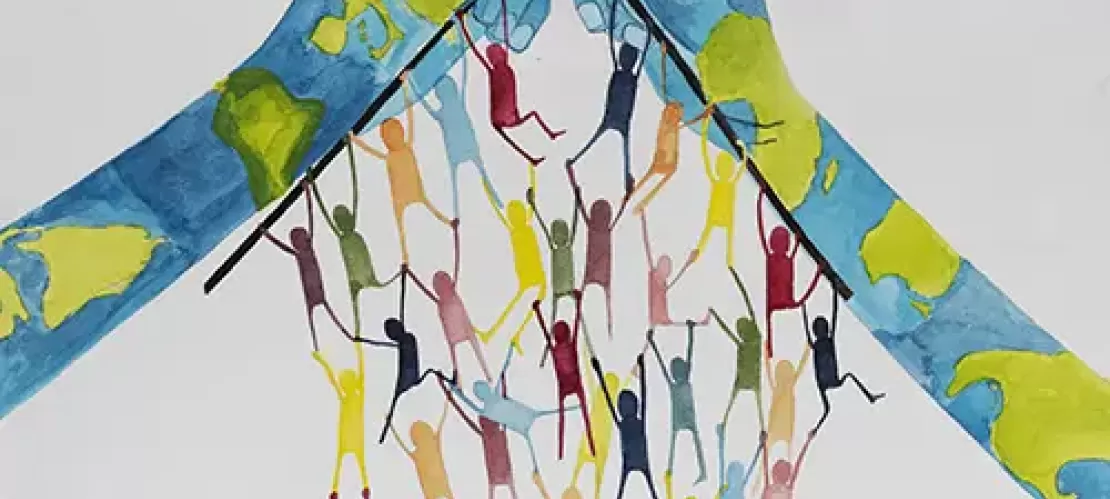
"My poster represents the Earth and the fact that it brings us all together. People are holding on to each other; if one person lets go, the rest of them will fall. We are all connected to the planet and one another." This is the description of a drawing by Anja Rožen, a 13-year-old student from a primary school in Slovenia, which illustrated the cover of the first text I read in my specialization in Global Health. I cherish the image of weavers, I often catch myself using metaphors about working with fabrics and patchwork. I find myself thinking about this large fabric that connects me to Anja, how her creation comes to me, and how her anguish resembles mine.
I suspect that it is the fear of paralysis that provokes me to get in touch with those who move I do not know if it was the disease that almost paralyzed me at birth, or the fact that I was born in a country town in Brazil, or even the curiosity about other worlds fed by literature and history classes, but something from a very early age invited me to look at the greatness of the world and the possibility of crossing borders.
However, this coming and going was not so free. The more I learned about the world, the more I realized that my steps and the steps of others were surrounded by walls carrying the name of our nationality, colour, gender, class. The real experience of exclusion goes through a multiplicity of painful daily experiences of deprivation, but also of deceptive inclusions. Once the deception is discovered, there is no way to unsee it.
The discovery may have been when I saw for the first time the photo of Alan Kurdi in the newspapers, and the huge commotion that lasted just a few days. Or the habit of Europeans taking my arm to compare our skin colours when I say that in my country I am considered “white”. Or the visa I was denied on a blooming pink sheet after a three-minute conversation, because being a young single woman with no kids is a sign that I do not have enough ties to my country. Or the event on the future of Europe that did not have any panellists from the Global South or people of colour.
Or maybe, it was with Rosa. In a park on a December afternoon in Bogotá, Rosa and I sat on a bench watching her two children playing. She tells me she had cried for a year, repeating to herself that she wanted to go back to Venezuela. “I was happier, I liked dressing up more, now it's like... arriving and not arriving at my home, for me there is nothing familiar here. I feel like I'm about to explode”. Paused and looked at the kids. She had to leave them alone at home while she works as a seamstress, €0.30 per pair of pants. “Being an immigrant is not a crime, going out to look for a better life is not a crime”.
To embrace the chance to go is also to embrace the need to leave. Clarice Lispector, my favourite author, a Ukrainian who considered herself Brazilian, wrote about the loss of the third leg, the one that is unnecessary but present for so long that it hurts when it is gone. About to get my flight and cross an ocean, it is just me and my two legs. Perhaps the third leg was my bedroom packed with photos on the walls; my town and the small cobblestone street where we used to dance every Wednesday; my strong mother who survived on her own after my father abandoned her while I was studying abroad. None of these is here right now. The reality in front of me, which translates as a dream that came true, brings with it a cold, and I am not talking about the weather in Warsaw or Oslo. It is a chill in the spine, or in the stomach, that cannot be resolved with heat.
I remember one of the Psychology classes years ago, in which students recorded people coming and going at a bus station. At the beginning of a presentation, the group handed out a small piece of paper, a “ticket”, with some questions: Where are you? Where are you going? What do you bring? What paths did you draw? What did you leave? Who did you leave? I still carry this paper in my diary. In some days, it is easier to answer them. In most of them, not. But I keep asking myself.
There is a distance between the girl I was and the woman I am, where home is and can be. I do not know how to map the distance; a new corner seems to appear every time I approach. It is like a broken internal compass, which makes me go round and round, but without ever letting me go back to the starting point. Even lost, I know that a lot of ground and sky has already been covered. And that despite the lack of the third leg, I do not walk alone.
I am about to meet my future classmates, women from Lebanon, Pakistan, Malaysia, China, Turkey, France, Germany, USA, who are somehow united by our passion for studying psychology, diversity, and other people on the move. Rosa moved out of necessity, I out of curiosity, or out of the certainty that to stand still while the walls go up is to forget about the Roses. To move so others can too. I will cross one more frontier, pursuing the thread that involves all of us, in the hope that we do not lack wire, like Anja; in the hope that we weave dreams of dignified life, not 30-cent pants.
